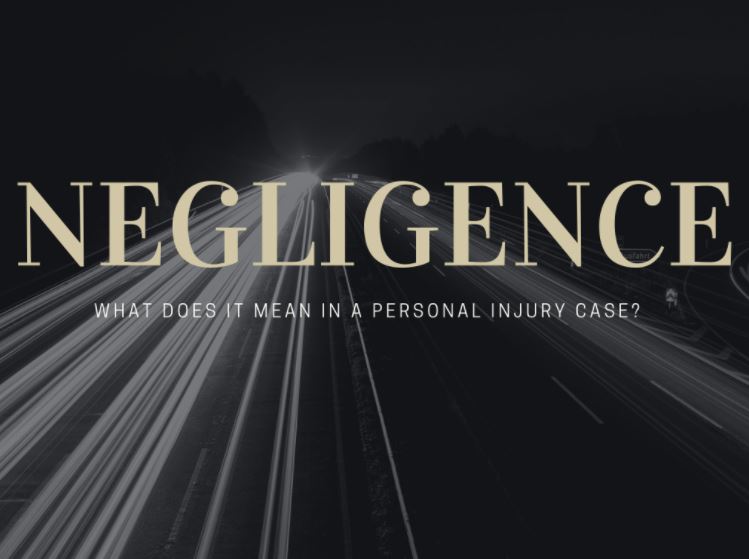| Toll Free : 1844 495 7333(injury hotline- new cases only) | |
| Text a Personal Injury Lawyer 24/7 and get instant help.TM (416 931 5015) | |
| Head Office : 905 495 7333 |
Establishing Negligence in a Personal Injury Case
January 18, 2021When it comes to claiming insurance for personal injury, it becomes necessary to establish negligence by the party at fault. But in such cases, you have to rely on establishing negligence. If you can prove that your injury is the result of another party, only then your case may have a chance.
But in my experience, most people are unaware of the concept of “negligence.” Well, don’t worry because I’ll discuss it and show how you can establish it.

What is Considered Negligence in Personal Injury Cases?
Understanding negligence in personal injury cases is a pretty simple process. The first step towards proving the negligence of the other party is to establish that it was their duty to take care of the situation in the first place.
You have to establish that their actions or lack of them to make the surrounding/situation safe resulted in your injury.
The next step is to show ‘how’ the other party’s actions resulted in your injury. After establishing that, you have to prove that your injuries are real and caused by the other party’s negligence. The reasonable amount of duty of care that the party-at-fault is supposed to provide varies from one case to another.
The term ‘Duty of care’ reminds a person of their responsibility to avoid potential harm caused to another. This duty of care can be applied for a house owner to make the place safe for tenants, a car owner to operate the vehicle safely to avoid possible accidents, etc.
There is a reason why there are so many laws when it comes to driving on the road. A driver is obligated to follow a set of rules that may include a speed limit, turning lights on during certain times, following the traffic lights, etc.
That’s why it is necessary to establish the ‘duty of care’ so that you can move forward to proving/showing how the person breached it with negligence. You have to show how the person violated the conduct that resulted in your injury.
Proving Negligence in a Personal Injury Case?
In my experience, one doesn’t need to establish negligence or duty of care most of the time. You might not even hear those words from your attorney or the defendant’s side. It happens when the cause of your injury is pretty much conspicuous, and there’s no need to find a witness or take pictures of the scene.
If you are wondering that there will be a court hearing, let me tell you that it will probably not happen. There will be you and your attorney in a room negotiating the compensation with the other side. All you will discuss is whose fault resulted in the accident and how much compensation you should receive.
Considering the Important Aspects of Duty of Care
When it comes to establishing the duty of care in a personal injury case, one needs to keep answers ready for two important questions-
- Who is supposed to provide the duty of care and to whom?
- What counts as the duty of care under a specific case?
Let me explain how to answer these questions with an example. Imagine there’s a restaurant with customers coming-in frequently. Now it is considered as the duty of the owner to make the premises safe for the customers. But there are no set legal guidelines to list down those safety measures.
The law demands “reasonable” measures to be taken. These may include frequent checking for any spills which may cause slips. But there’s no monitor for that and no specific number to how many times one must check for it.
So being a victim of such an accident can put you in a position where you have to prove that the steps taken were not reasonable enough to make the place safe.
When is Someone Considered Negligent?
Establishing the duty of care is not that hard when the property that caused the injury belongs to someone else. But if you can prove that the person was careless with the property and didn’t live up to the expectations, it is considered negligence or breach of ‘duty of care.’
Proving negligence isn’t that hard in most cases. For example, a driver is considered negligent if driving over the specified speed limit causes an accident. It can also be considered negligence if a store owner forgets to put up the “wet floor” sign while mopping the floor and an accident happens.
To make such cases a success, one may need a witness who can prove that the person was driving too fast or didn’t stop at the red light, or the owner didn’t put up any signs to inform customers about the wet floor. If the jury trusts the witness, only then you gain credibility and win such a case.
But it can also be hard to convince the jury at times. Your case may get complicated if the jury puts questions about your negligence. For example, if you inform the restaurant or the house owner about the dangerous condition and they fail to fix them. In the meantime, you get injured. The jury may ask you, “why didn’t you try to avoid the dangerous condition even after knowing it?”
In such cases, you need to establish the lack of alternatives you had. Also, remind them of the duty of care of the party-at-fault.
Once you have proven the negligence in your personal injury case, you can quote the damages you sustained, including the physical, emotional, and financial damages. In the end, it all comes down to how much compensation you want to receive. It may be difficult for you to come up with a specific amount but don’t worry. In such cases, it is wise to take legal advice from a professional consultant or a lawyer. Going for personal injury lawyers who specifically deal with a case like yours may be your best bet. And you don’t even need to look too far. You can just come to us as we have one of the best lawyers who can provide you with the right kind of support so that you can get back on your feet and leave your injuries behind. To learn more, book your consultation with us now.
Establishing Negligence in a Personal Injury Case
January 18, 2021When it comes to claiming insurance for personal injury, it becomes necessary to establish negligence by the party at fault. But in such cases, you have to rely on establishing negligence. If you can prove that your injury is the result of another party, only then your case may have a chance.
But in my experience, most people are unaware of the concept of “negligence.” Well, don’t worry because I’ll discuss it and show how you can establish it.

What is Considered Negligence in Personal Injury Cases?
Understanding negligence in personal injury cases is a pretty simple process. The first step towards proving the negligence of the other party is to establish that it was their duty to take care of the situation in the first place.
You have to establish that their actions or lack of them to make the surrounding/situation safe resulted in your injury.
The next step is to show ‘how’ the other party’s actions resulted in your injury. After establishing that, you have to prove that your injuries are real and caused by the other party’s negligence. The reasonable amount of duty of care that the party-at-fault is supposed to provide varies from one case to another.
The term ‘Duty of care’ reminds a person of their responsibility to avoid potential harm caused to another. This duty of care can be applied for a house owner to make the place safe for tenants, a car owner to operate the vehicle safely to avoid possible accidents, etc.
There is a reason why there are so many laws when it comes to driving on the road. A driver is obligated to follow a set of rules that may include a speed limit, turning lights on during certain times, following the traffic lights, etc.
That’s why it is necessary to establish the ‘duty of care’ so that you can move forward to proving/showing how the person breached it with negligence. You have to show how the person violated the conduct that resulted in your injury.
Proving Negligence in a Personal Injury Case?
In my experience, one doesn’t need to establish negligence or duty of care most of the time. You might not even hear those words from your attorney or the defendant’s side. It happens when the cause of your injury is pretty much conspicuous, and there’s no need to find a witness or take pictures of the scene.
If you are wondering that there will be a court hearing, let me tell you that it will probably not happen. There will be you and your attorney in a room negotiating the compensation with the other side. All you will discuss is whose fault resulted in the accident and how much compensation you should receive.
Considering the Important Aspects of Duty of Care
When it comes to establishing the duty of care in a personal injury case, one needs to keep answers ready for two important questions-
- Who is supposed to provide the duty of care and to whom?
- What counts as the duty of care under a specific case?
Let me explain how to answer these questions with an example. Imagine there’s a restaurant with customers coming-in frequently. Now it is considered as the duty of the owner to make the premises safe for the customers. But there are no set legal guidelines to list down those safety measures.
The law demands “reasonable” measures to be taken. These may include frequent checking for any spills which may cause slips. But there’s no monitor for that and no specific number to how many times one must check for it.
So being a victim of such an accident can put you in a position where you have to prove that the steps taken were not reasonable enough to make the place safe.
When is Someone Considered Negligent?
Establishing the duty of care is not that hard when the property that caused the injury belongs to someone else. But if you can prove that the person was careless with the property and didn’t live up to the expectations, it is considered negligence or breach of ‘duty of care.’
Proving negligence isn’t that hard in most cases. For example, a driver is considered negligent if driving over the specified speed limit causes an accident. It can also be considered negligence if a store owner forgets to put up the “wet floor” sign while mopping the floor and an accident happens.
To make such cases a success, one may need a witness who can prove that the person was driving too fast or didn’t stop at the red light, or the owner didn’t put up any signs to inform customers about the wet floor. If the jury trusts the witness, only then you gain credibility and win such a case.
But it can also be hard to convince the jury at times. Your case may get complicated if the jury puts questions about your negligence. For example, if you inform the restaurant or the house owner about the dangerous condition and they fail to fix them. In the meantime, you get injured. The jury may ask you, “why didn’t you try to avoid the dangerous condition even after knowing it?”
In such cases, you need to establish the lack of alternatives you had. Also, remind them of the duty of care of the party-at-fault.
Once you have proven the negligence in your personal injury case, you can quote the damages you sustained, including the physical, emotional, and financial damages. In the end, it all comes down to how much compensation you want to receive. It may be difficult for you to come up with a specific amount but don’t worry. In such cases, it is wise to take legal advice from a professional consultant or a lawyer. Going for personal injury lawyers who specifically deal with a case like yours may be your best bet. And you don’t even need to look too far. You can just come to us as we have one of the best lawyers who can provide you with the right kind of support so that you can get back on your feet and leave your injuries behind. To learn more, book your consultation with us now.








